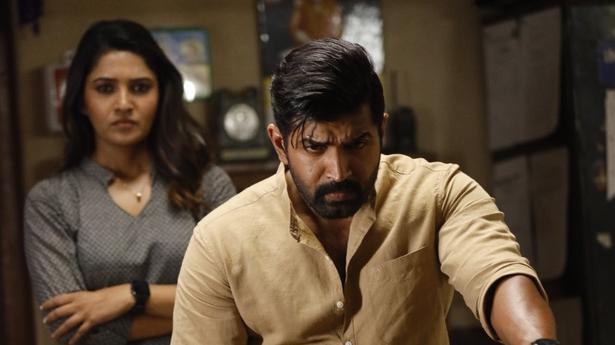‘Sinam’, meaning rage, refers to Arun Vijay’s emotional state. It is also the same emotion we feel towards the film
‘Sinam’, meaning rage, refers to Arun Vijay’s emotional state. It is also the same emotion we feel towards the film
It’s infuriating and disheartening when films remind us that most online film discourses about sensitive issues may not even reach some creators or may not make a difference in how they would choose to tell their stories. I say this because G.N.R Kumaravelan’s Sinam is a perfect example of how not to depict sexual assault and why it is counter-productive to write scenes that attempt to milk the emotions of the audience. Sinam tells the story of a police officer named Pari Venkat (Arun Vijay) who vows to take revenge on the culprits who sexually assaulted and killed his wife Madhangi a.k.a Madhu (Palak Lalwani). Yes, it’s the age-old police revenge saga and it is told in an even more archaic fashion.
Sinam’s misfires begin right from the beginning. We first meet sub-inspector Pari at a local pub where he arrests an accused while disobeying the orders of his superior. The classic hero introduction fight happens. Pari even holds the side of a goon’s face on a hot Parotta frying pan. In short, Pari is the cop in need of anger management (The title ‘Sinam’ means rage in Tamil). Now, in any masala actioner, when you see a hero inflict such violence on a rowdy, you wouldn’t ring sirens for human rights and question the ethics of a police officer. It’s the unwritten rule of masala cinema that you let those things slide, and here, the goon was definitely obstructing a police officer from doing his duty. But Sinam is not one of those masala entertainers where you let such things slide. In retrospect, this visual of Pari making meat patties out of goons nags you because this is a film that takes itself quite seriously and wants you to believe that Pari is, or at least was, the ultimate symbol of justice.
Now, keeping aside this introduction scene, the way the first act is set up itself works against any suspense or shock that the conflict would have elicited. The film doesn’t give us anything about the criminal case that Pari was handling in the beginning when he arrests the goon, and we then extensively see the love story of Pari and Madhu from the first time they met each other. Generic scenes are stacked one after the other, and given all the information one has in hand, it’s not hard to guess what’s about to come from a mile away.
Madhu dies, unfortunately. The scenes that immediately follow her death are like a forewarning of what’s awaiting us in the end because there are repeated attempts at thrusting melodrama. The police procedural that begins soon is another misfire on many levels. After a brief suspension for assaulting his superior, Pari is once again reinstated. The top cop (RNR Manohar) assigns the case of his wife’s death to Pari, the grief-stricken cop who is visibly emotionally unstable. “Personal emotional connect is necessary for such a case,” he justifies. Conflict of interest? Who cares as long as this puts the hero cop on the route to getting justice? While any other cop would have started by checking CCTV footage, it’s the third or fourth step in Pari’s investigation. In a scene, Pari writes all the reasons that can cause a murder — like revenge, money, and sex — and circles on revenge. One begins to wonder if he will zero in on each of those reasons and if this will open up a larger world with more mysteries. None of that happens.
An unengaging, generic investigation ends with the culprits spilling the truth. Now when the culprits speak about what they did to Madhu, is it necessary to show all of it visually, in the most insensitive fashion possible? One might argue that it’s a creator’s choice about what to show, but for a film that speaks against sexual assault, it also portrays the male gaze to add to the scene’s distaste.
Sinam is the kind of movie that tires you to the extent you begin to not care to count its flaws. Disguised under the safe cloak of ‘good intentions’, the film is condescending to the audience’s intellect. It picks low-hanging fruits that appease the basic instincts of the mind and gives its all to exploit it and milk an emotional response. From the perspective of craft, it’s a film that doesn’t move an inch towards novelty, with the writing being ineffective. It’s unfortunate since Arun Vijay, just like in his previous release Tamil Rockerz, a web series, puts all his effort into bringing Pari to life. In fact, Arun looks chiselled and adheres to the standards set for action-hero cops in cinema.
The cherry on top of all that went down in Sinam is the dialogue the hero utters in the end to justify his anger, and why it’s important to instill fear among sexual predators. . In a day and age where people talk about the possibility of alternate justice or restorative justice, the importance of teaching sex education to minors, and methods that can prevent rape, this is a reminder nobody asked for. If it’s a reminder of anything, it is that filmmakers should step out of their chambers and understand why they want to tell a story, and stop belittling the intellect of the audience.
Sinam is currently running in theatres




